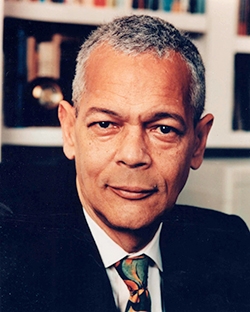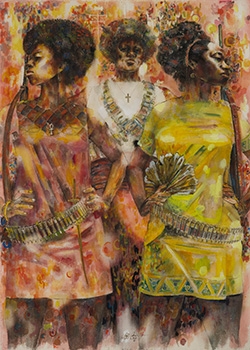Eminent civil rights leader Julian Bond is coming to Dartmouth as part of a celebration of the 50th anniversary of the Civil Rights Act of 1964. He will speak on Thursday, Oct. 30 at 4:30 p.m. in the Hood Museum of Art Auditorium.

Bond’s appearance is in conjunction with the exhibition “Witness: Art and Civil Rights in the Sixties” on display at the museum through Dec. 14.
“The ‘Witness’ exhibit teaches us about the civil rights movement as no text can,” says Bond, Distinguished Professor in Residence at American University, and professor emeritus of history at the University of Virginia.
Bond’s long and distinguished career at the forefront of social change includes being a founder of the Student Nonviolent Coordinating Committee (SNCC), serving as chairman of the board of the NAACP, and serving as first president of the Southern Poverty Law Center. Bond also served 20 years in the Georgia House and Senate, drafting more than 60 bills that became law.
“This is an extraordinary opportunity for Dartmouth students, who have responded very enthusiastically to the ‘Witness’ exhibition, to hear Mr. Bond’s reflections on this historic decade and his lifelong activism for political and social justice,” says Lesley Wellman, Hood Foundation curator of education. “I am sure his talk and the opportunity to ask questions afterward will be deeply inspiring to them and everyone in attendance.”

The Hood describes “Witness: Art and Civil Rights in the Sixties” as “a focused look at painting, sculpture, graphics, and photography from a decade defined by social protest and American race relations. Sixty-six of the decade’s artists, including African Americans and some of their white, Latino, Asian American, Native American, and Caribbean contemporaries, used wide-ranging aesthetic approaches to address the struggle for racial justice.”
Evelynn Ellis, Dartmouth’s vice president for institutional diversity and equity, says, “If Mr. Bond and thousands of others need any proof that the many years they have put into the Civil Rights struggle have not been in vain, they need only see the joyful sense of peace on my face as I, a vice president at an Ivy League institution, walk through the Hood’s Witness exhibit. We are getting there, Mr. Bond.”
Bond’s presentation is co-sponsored by the museum and the College’s Office of Institutional Diversity & Equity. “Witness: Art and Civil Rights in the Sixties” is organized by the Brooklyn Museum and made possible by the Ford Foundation. The exhibition’s presentation at the Hood is supported by Claire Foerster and Daniel S. Bernstein ’87, Kate and Yaz Krehbiel ’91, Thayer ’92, and the Leon C. 1927, Charles L. 1955, and Andrew J. 1984 Greenebaum Fund.


